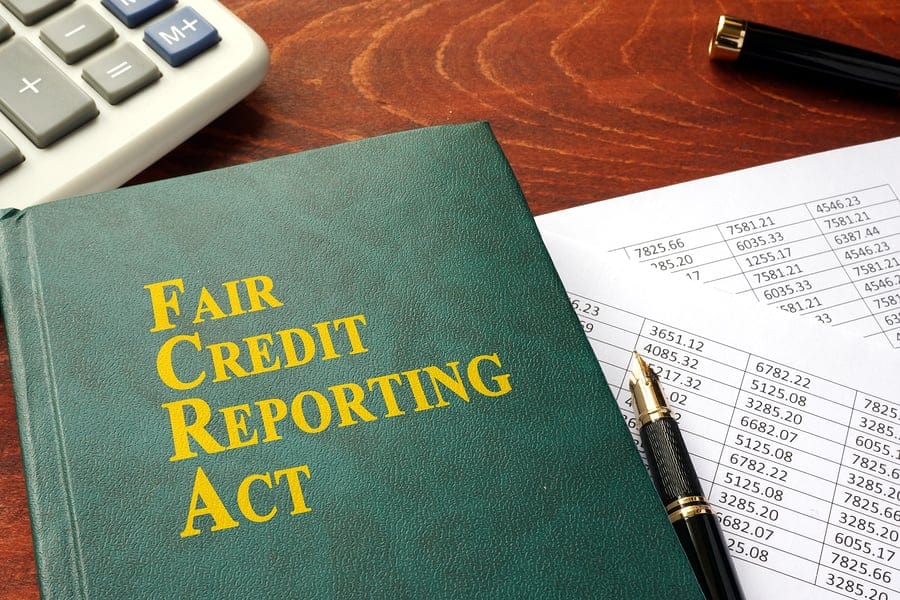Why Credit Reporting Laws Matter More Than You Think
Credit reports don’t just determine whether someone qualifies for a loan. They show up in unexpected places—job applications, apartment leases, insurance policies, even security clearances. A single mistake in a credit file can cost someone a job offer or housing approval without them ever realizing what went wrong. And when companies misuse consumer reports? That’s when lawsuits start flying.
The Fair Credit Reporting Act (FCRA) was passed to keep companies from pulling, sharing, or using consumer credit data however they please. It sets hard limits on who can access these reports, what information can be included, and what rights consumers have when errors or violations happen.
Most people only learn about the FCRA when something goes wrong—a job rejection over a background check, a credit denial that doesn’t make sense, or a debt that shouldn’t exist suddenly appearing on a report. But businesses and employers need to pay attention too. FCRA lawsuits are among the most expensive compliance failures a company can face, with settlements regularly reaching millions of dollars for class-action claims.
If you’ve never had to challenge a mistake on your credit report, consider yourself lucky. If you run a business that handles consumer data, consider yourself warned.
The Core of the FCRA: What It Actually Protects
There’s a reason the FCRA keeps credit bureaus, employers, and financial institutions on edge—this isn’t just a “best practices” guideline. It’s a federal law with teeth, and companies that ignore it end up in court.
At its core, the FCRA does three things:
- Gives consumers the right to access and challenge their credit reports
- Limits when and how businesses can pull a credit or background check
- Forces companies to notify people when credit information is used against them
Sounds simple, right? In reality, these rules are broken all the time, which is why the FCRA remains one of the most litigated consumer protection laws in the country.
How the FCRA Protects Consumers (And Why That Matters More Than You Think)
The idea behind the Fair Credit Reporting Act seems simple: keep credit reporting fair, accurate, and private. But if that were happening consistently, FCRA lawsuits wouldn’t exist.
For consumers, the law acts as a safety net when companies mishandle credit data. It’s supposed to ensure that:
- People aren’t blindsided by bad credit information that isn’t even theirs
- Employers and landlords don’t make decisions based on old or incorrect data
- Consumers know when and why their credit history is being used against them
In theory, the FCRA gives consumers the power to challenge mistakes, dispute false claims, and hold companies accountable. In reality? Many people don’t even know they have these rights until something goes wrong.
The Most Common Ways Consumers Get Burned by Credit Reporting Errors
Here’s how things often play out when FCRA violations happen in the real world:
- Wrong Information, Wrong Life Consequences – A consumer applies for a mortgage and gets rejected. When they check their credit, they see a loan they never took out is dragging down their score. It turns out their file got mixed up with someone else’s—but the bank doesn’t care. They need that error fixed now, or they lose the house.
- Job Offers That Disappear Overnight – A company runs a background check on a promising candidate. The report comes back with a criminal record—except the person applying for the job has never been arrested. By the time they find out about the mistake and dispute it, the employer has already moved on.
- Debt That Won’t Go Away – A debt collector keeps calling about an account that was settled years ago. The consumer disputes it with the credit bureau, but the false debt keeps reappearing. Now, their credit score is in free fall, and no one seems willing to fix it.
These scenarios aren’t just frustrating—they’re exactly why the FCRA exists. And when credit bureaus, lenders, or employers ignore the law, that’s where lawsuits come in.
FCRA Lawsuits: What Happens When Companies Ignore the Rules
FCRA violations aren’t just an inconvenience—they’re a major legal liability for companies that don’t take compliance seriously.
When businesses fail to follow the law, they don’t just face consumer complaints—they face multi-million dollar lawsuits. Some of the biggest FCRA violations come from:
- Employers running illegal background checks – If a company doesn’t properly disclose that they’re running a background check—or they don’t get written permission—they can be sued. Big-name companies have paid millions in class-action settlements for FCRA violations.
- Credit bureaus ignoring disputes – When credit reporting agencies fail to correct errors, they’re not just inconveniencing people—they’re breaking the law. If a consumer disputes something on their report and the bureau doesn’t fix it within 30 days, that’s an FCRA violation.
- Debt collectors reporting false information – Some companies report old debts as new, making it look like a consumer still owes money they already paid. That’s not just unethical—it’s illegal under the FCRA.
For businesses, getting sued under the FCRA isn’t just bad press—it can lead to massive settlements and legal fees.
For consumers, having a handle on these rights can be the difference between fixing a mistake quickly or fighting a long, uphill battle for justice.
FCRA Compliance: What Businesses Need to Get Right
For companies that rely on consumer credit data—whether for hiring, lending, renting, or insurance decisions—the FCRA isn’t just a set of suggestions. It’s a federal law with serious consequences for getting it wrong.
Most businesses don’t set out to violate consumer rights. But the most common FCRA lawsuits don’t happen because companies deliberately break the rules. They happen because:
- Employers don’t realize they need written consent before running a background check
- Landlords deny tenants based on credit reports but fail to notify them why
- Debt collectors report incorrect or outdated information, then ignore disputes
And when those mistakes happen, it’s not just one angry customer filing a complaint—it sometimes means an entire class-action lawsuit.
How Companies End Up in FCRA Lawsuits
Some of the biggest FCRA cases in history have started with small, routine compliance failures. A missed disclosure form, a credit check pulled without permission, a rejected job applicant who was never told why.
A few real-world examples of how businesses have ended up in court over FCRA violations:
- Employers Who Skip Disclosure Forms – A company runs background checks on all new hires but buries the disclosure in the middle of a long employment application instead of providing it as a separate, clear document. The result? A $3 million class-action settlement for violating the FCRA’s background check rules.
- Credit Bureaus Ignoring Disputes – A consumer challenges an error on their credit report. The bureau fails to investigate or correct it within 30 days. That leads to a lawsuit—and a multi-million dollar settlement for failing to comply with FCRA-mandated dispute procedures.
- Landlords Running Unauthorized Credit Checks – A rental company pulls credit reports on applicants without their written consent. When tenants find out, they file an FCRA lawsuit—and win, because the law is clear on needing explicit permission.
For businesses, the easiest way to avoid these lawsuits is to take FCRA compliance seriously. That means understanding the rules, training employees who handle consumer reports, and having a clear process for handling disputes and disclosures.
For those that aren’t sure whether their practices are compliant, Conn Maciel Carey’s guide to FCRA-compliant background checks is a great resource for businesses looking to stay ahead of potential legal risks.
Ignoring FCRA Rules Can Cost Companies Millions
Many companies assume FCRA violations aren’t a big deal—until they get hit with a lawsuit.
Businesses that mishandle consumer credit data can be sued for statutory damages of up to $1,000 per violation—and that adds up fast in a class-action case.
Some of the biggest FCRA settlements include:
- $68 million – A major retailer paid this after improperly disclosing background checks to job applicants.
- $24 million – A credit reporting agency was sued for reporting inaccurate criminal history records without properly verifying them.
- $10 million+ settlements – Common in cases where employers fail to follow FCRA background check rules.
And these cases aren’t just about paying out settlements. Companies that get sued under the FCRA can face:
- Massive legal fees defending against consumer claims
- Reputational damage from being labeled as a company that violates consumer rights
- Increased regulatory scrutiny from agencies like the CFPB and FTC
For employers, landlords, and financial institutions, getting FCRA compliance right isn’t optional—it’s essential.
What to Do If Your FCRA Rights Are Violated
The FCRA gives consumers real power—but only if they know how to use it. Too many people accept credit reporting mistakes as unavoidable or assume they can’t fight back when a company misuses their data. In reality, the law provides clear steps for disputing errors, challenging unauthorized credit checks, and even suing when necessary.
Step 1: Check Your Credit Reports for Mistakes
Most people don’t find out about a credit reporting error until it costs them something—a denied loan, a rejected rental application, a lost job opportunity. But under the FCRA, you have the right to check your credit report for free once a year from the three major bureaus:
- Equifax
- Experian
- TransUnion
Beyond the annual free report, if you’ve been denied credit, housing, or employment based on your report, you can request a free copy from the agency that supplied it.
Step 2: Dispute Any Inaccuracies
If a credit report contains incorrect, outdated, or fraudulent information, you have the right to dispute it—and the credit bureau has to investigate within 30 days.
When filing a dispute, include:
- A clear explanation of what’s wrong
- Any supporting evidence, such as account statements or court records
- A request for the bureau to fix or remove the error
Credit bureaus are required to correct or delete inaccurate information unless they can verify it as correct.
Companies can’t just pull your credit report whenever they want—they need a legitimate reason under the FCRA. If you see an unauthorized inquiry, you can:
- Contact the credit bureau and request its removal
- Reach out to the company that pulled the report and demand proof of authorization
- File a complaint with the CFPB or FTC if the company refuses to correct it
Why does this matter? Because multiple hard inquiries lower credit scores, and unauthorized ones shouldn’t be there in the first place.
Step 4: Take Legal Action if Necessary
When credit bureaus, employers, or lenders ignore disputes, misuse reports, or refuse to correct errors, the FCRA allows consumers to sue.
You may have a case if:
- A credit bureau fails to fix an error after you’ve disputed it
- An employer runs a background check without your permission
- A company denies you credit or employment but doesn’t notify you properly
- A business pulls your credit report without a valid reason
Consumers can recover damages for financial losses, and in some cases, companies that willfully violate the FCRA may have to pay punitive damages and legal fees.
Final Thoughts: The FCRA in Action
Most people don’t think about credit reporting laws—until they have to. When a mistake costs someone a job, a home, or financial security, knowing what the FCRA protects and how to fight back can make all the difference.
For businesses, compliance isn’t just about avoiding lawsuits—it’s about trust. Mishandling consumer reports doesn’t just lead to financial penalties; it damages reputations, turns customers away, and creates long-term consequences that aren’t easy to fix.
For consumers, the message is clear: don’t let a credit reporting mistake go unchallenged. The law is on your side—you just have to use it.






